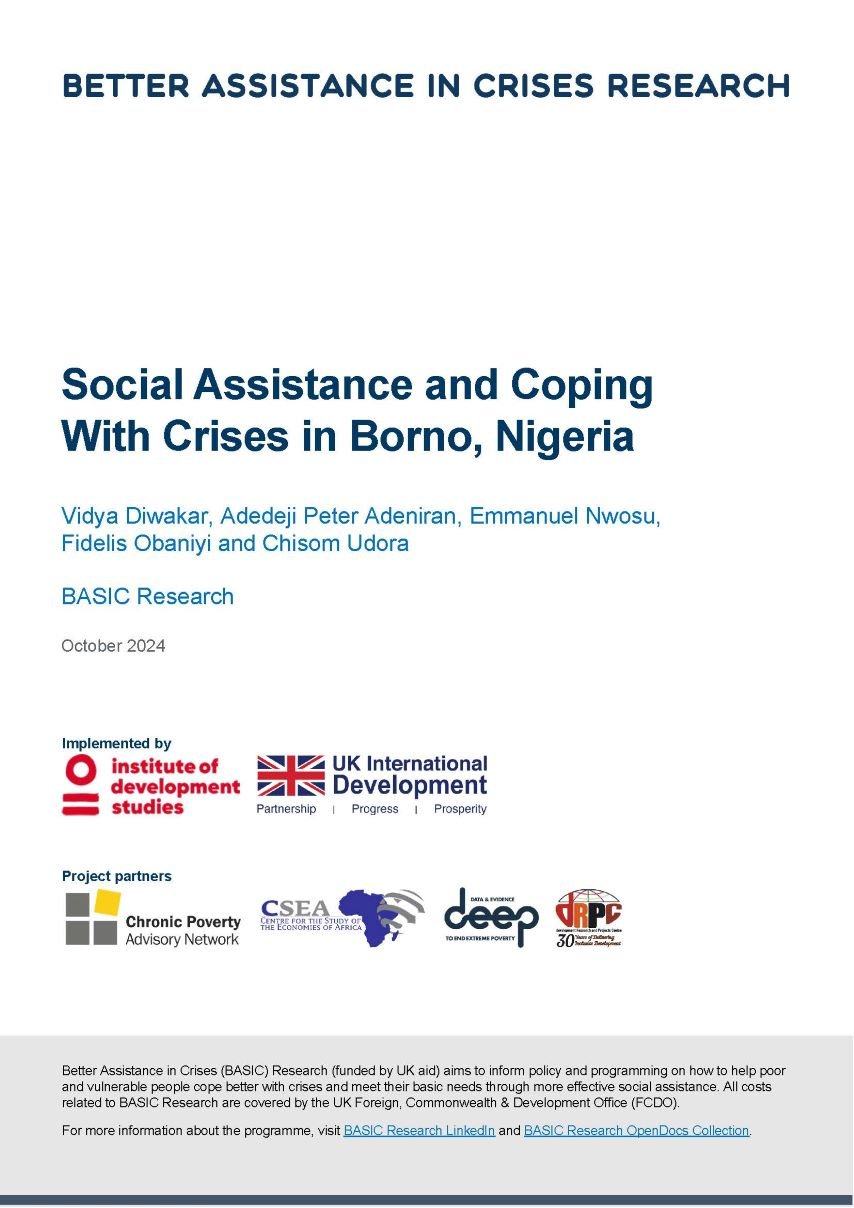This paper investigates the role of crises (e.g. armed conflict, displacement, climate-related disasters, Covid‑19, and economic crises) in driving negative poverty trajectories in Nigeria, alongside the extent to which social assistance may be fit for purpose to respond to intersecting crises. The paper adopts a mixed-methods approach, bringing together analysis of quantitative survey data from 2010 to 2023, with qualitative data collected in six states across the country’s six geopolitical zones in 2023. Study findings point to intersecting crises driving both the acuteness of chronic poverty as well as new instances of impoverishment that are becoming sustained. Social assistance – albeit constrained by limited coverage – plays an important role by supporting promotive and protective means of coping during crises. Based on the study findings, policy recommendations include expanding social assistance coverage, strengthening conflict resolution and peace-building, promoting equity-centred economic policy responses, and addressing underlying structural challenges.
Social Assistance and Coping With Crises in Borno, Nigeria
This paper examines the relationship between social assistance, violent conflict, and intersecting crises, and considers how social assistance can help offset erosive forms of coping that could otherwise drive poverty and food insecurity.
To investigate these issues, the study draws on newly collected household data covering 1,000 survey respondents in 2023 from the Konduga and Maiduguri Municipal Council local government areas in Borno, Nigeria. Borno has been an epicentre for violence over the past 15 years, and has experienced a range of intersecting crises.
Study findings indicate that 43 per cent of households experienced disruptions to income or agriculture, or asset loss, either due to conflict, flooding, or drought. Of these households, 41 per cent reported that more than half of their income source was lost. Despite the negative effects of crises, only 1 in 10 households received social assistance in the year preceding the survey, mainly through non-governmental organisations. This indicates that social assistance is simply not getting through to the people who need it.
Perhaps as a result, households are increasingly drawing on negative and even erosive forms of coping – for example, by being less able to save, less able to make investments, and increasing reliance on loans that together could drive downward mobility. The paper concludes with broad-brush implications for social assistance programmes to become more effective amidst violence and climate-related disasters.
The paper is authored by Vidya Diwakar, Adedeji Peter Adeniran, Emmanuel Nwosu, Fidelis Obaniyi, Chisom Udora
Poverty dynamics and social protection in Nigeria
Nigeria has a large and growing share of people living in poverty. Roughly 40.1% of its population live below the national poverty line, while a similar share (46.4%) are multidimensionally poor based on deprivations in education, health, and living standards. Covid19 has amplified these concerns, forecasted by the World Bank to push an estimated additional 10 million Nigerians into extreme poverty by 2022.
This study investigates key drivers associated with descents into and exits from relative monetary poverty across zones of Nigeria, the ways in which COVID-19 pandemic are likely to impact these dynamics, and implications for the design of social protection programmes and policy in Nigeria. It analyses: 1) the Nigeria General Household Survey Panel from 2010/11-2015/16, 2) nine rounds of the Covid19 National Longitudinal Phone Survey 2020-2021, 3) the Nigeria Living Standards Survey 2018/19, and 4) a series of key informant interviews with social protection stakeholders in 2021. The results of the study point to a combination of asset and livelihood-based enablers for households to sustain poverty escapes, and draw out implications for the design of social protection in Nigeria in the time ahead.
Authors: Vidya Diwakar and Adeniran Adedeji
The research is funded through FCDO and commissioned by Save the Children International (Nigeria) and Action Against Hunger through the Child Development Grant Programme.
(In)tangible assets: The road to economically empowering poor women in Bangladesh and Nigeria
This report assesses drivers of the economic empowerment of chronically poor women and girls in rural Bangladesh and rural Nigeria. The focus is on drivers related to assets, both intangibly in terms of education, and tangibly in terms of ownership of consumption and productive assets including land.
Read MorePolicy Brief: Financial Inclusion in Nigeria
This policy brief provides a situation analysis on financial inclusion in Nigeria, including a short analysis of how it may figure in chronic poverty, and processes of escaping poverty and impoverishment. It also goes on to assess the relevance of the four potential promising avenues identified in the global CPAN Financial inclusion Policy Guide (Smith et al 2015) for including the poorest people in Nigeria. This leads to a commentary on the e Nigerian Financial Inclusion Strategy.
Read More


